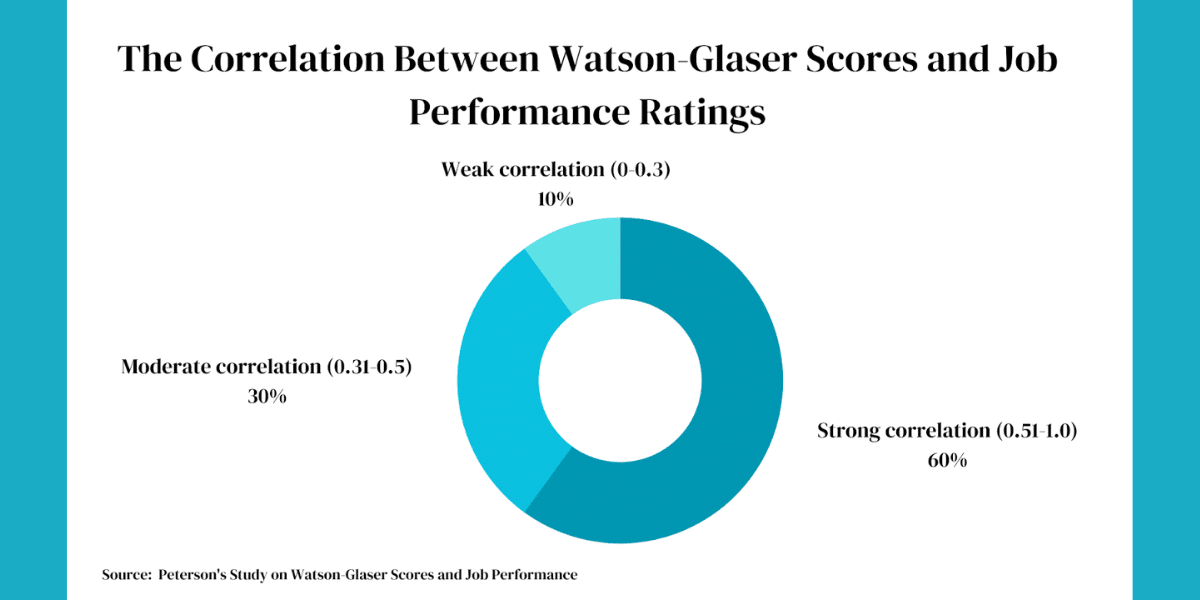By: SEO Mavens
Critical thinking is a crucial skill for success in today’s complex world. The amount of accessible information has increased dramatically. It is very important to be able to do the following:
- Analyze the arguments
- Interpret the data
- Select the images
- Make the right decision
This ability to think logically is essential in professional roles. Critical thinking is one of the most important skills managers possess, according to a study by the American Management Association(AMA).
Employers often use standardized tests to assess the critical thinking skills of job applicants. An example of this is the Watson-Glaser Critical Thinking Assessment (WGCTA). They are primarily for positions involving strategic analysis and decision-making. The Watson-Glaser test is widely regarded as the gold standard for assessing critical thinking and predicting performance.
This article examines the Watson-Glaser test in more detail. And how practice tests can improve your critical thinking skills.
Overview of the Watson-Glaser Critical Thinking Test
The Watson-Glaser critical thinking test is one of the most commonly used tools. It is to measure measurements carefully. It has been consistently updated over the past 90 years to remain relevant in today’s context. The purpose of the test is to provide a comprehensive assessment of an individual’s ability to:
- Define the information
- Identify the assumptions
- Evaluate arguments
- Make conclusions
Test Structure
The Watson-Glaser test consists of 40 questions that must be completed within 30 minutes. The questions are based on textual passages, charts, graphs, or shapes.
Assessment Areas
The test evaluates five core aspects of critical thinking. The following table summarizes the 5 critical thinking skills assessed in the Watson-Glaser test:
| Critical Thinking Skill | What It Tests |
| Inference (16 questions) | Evaluating inferences drawn from factual statements. |
| Recognition of Assumptions (11 questions) | Detecting unstated assumptions or presuppositions in given statements. |
| Deduction (10 questions) | Determining if certain conclusions necessarily follow from given information. |
| Interpretation (5 questions) | Weighing evidence and deciding if generalizations or conclusions are warranted. |
| Evaluation of Arguments (8 questions) | Distinguishing between strong and weak arguments. |
Question Types
The questions are in multiple-choice format with 5 answer options. The material used in the questions is generic. It’s comparable to what professionals encounter in real-life work situations. The test does not assess specialized knowledge. But it focuses on the thought process involved in critical thinking.
Why Take a Watson-Glaser Practice Test?
Take a watson glaser practice test even if you don’t have an upcoming assessment. It can provide many benefits:
Understand the Test Format
Familiarize yourself with actual Watson-Glaser practice questions. It’s the best way to get comfortable with the test structure and format. Critical thinking ability is culture-neutral. Because of that, the practice tests use passages with universal contexts.
Identify Knowledge Gaps
A practice test serves as a self-assessment tool. It will help you determine areas of critical thinking that need strengthening. You can then take steps to improve those skills through targeted study and practice.
Improve Time Management
Like the actual test, Watson-Glaser practice tests are timed. Repeated practice will teach you how to pace yourself so that you spend an appropriate amount of time on each question during the real test.
Build Speed and Accuracy
With regular practice, you will learn to read and comprehend questions quickly. And answer more accurately as you get accustomed to the way questions are designed.
Boost Confidence
Familiarity with the test format will help lower test anxiety. Scoring well on practice tests will also give you the confidence boost needed to ace the actual examination.
Get a Sense of Achievable Scores
Practice tests provide a benchmark to gauge your current critical thinking proficiency and what scores you can realistically aim for in the actual assessment.
Tips for Succeeding in the Watson-Glaser Test
Keep these tips in mind while prepping for the Watson-Glaser test:
- Rely solely on the given information – Do not make unsupported assumptions based on your background knowledge. Restrict your analysis only to the statements and data provided.
- Read questions carefully – Pay close attention to keywords like “must,” “possibly,” “not,” and “never,” which can alter the meaning.
- Look for logical flaws – Watch out for inconsistencies, fallacies, and assumptions that are not warranted by the evidence.
- Manage time efficiently – Move briskly through questions and don’t get fixated on any one difficult question. Flag questions you find hard for later review.
- Answer every question – Since there is no negative marking, attempt all questions even if you have to guess on some.
Watson-Glaser Scores and Their Significance

On the Watson-Glaser test, scores are provided as percentiles. They indicate your critical thinking ability compared to other test takers.
Score Interpretation
Typically, a score above the 75th percentile is considered excellent. And scores below the 25th percentile indicate weakness in critical thinking. The mean score on the Watson-Glaser test is around the 50th percentile.
Correlation with Performance
High Watson-Glaser scores indicate strong analytical skills. And predict enhanced work performance. This is especially true in jobs that require strategic thinking and data-based decision-making.
- A study found a 0.54 correlation between Watson-Glaser scores and supervisor performance ratings.
- Critical thinking skills also had significant correlations with overall success in legal practice. This is according to a meta-analysis.
Eligibility for Mensa
You need to score in the 95th percentile or above on the Watson-Glaser test to qualify for admission into Mensa. It is an organization for individuals with high IQ. Only the top 5% scorers are eligible.
Conclusion
In today’s information-rich work environment, critical thinking is a highly valued skill across various fields. The Watson-Glaser test provides an objective assessment of these skills. They are invaluable for a successful career.
By taking Watson-Glaser practice tests, you can familiarize yourself with the format. Understand your capability levels and take action to strengthen your critical thinking. With diligent preparation, it is possible to achieve high scores that can open doors to new opportunities.
Frequently Asked Questions
Q: Why is the Watson-Glaser Critical Thinking Appraisal so widely used?
A: The Watson-Glaser test is globally trusted due to its strong validity and reliability. It has been demonstrated through decades of research. It provides a domain-general evaluation of critical thinking skills applicable across professions.
Q: How should I prepare for the Watson-Glaser test?
A: These are the effective ways you can prepare for the test:
- Taking practice tests
- Learning time management strategies
- Understanding the question types
- Improve your logical and reasoning skills through consistent practice.
Q: What kind of jobs require the Watson-Glaser Critical Thinking Appraisal?
A: These are industries that use the Watson-Glazer test to screen candidates.
- Law firms
- Consulting agencies
- Financial institutions
- Government agencies
- Educational institutions
- Corporations across sectors
It’s especially used on candidates who are applying for managerial and leadership roles.
Q: What score do I need in the Watson-Glaser test to qualify for Mensa membership?
A: To qualify for Mensa admission, you must score in the 95th percentile or higher on the Watson-Glaser test. It is an organization for individuals with high IQs. Only the top 5% scorers are eligible.





